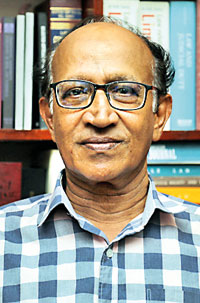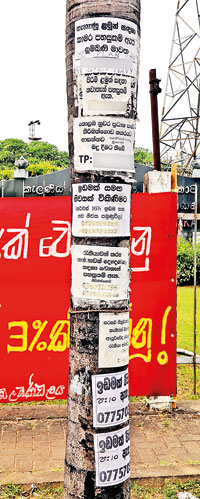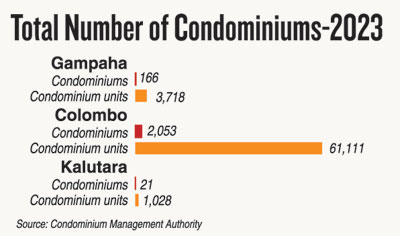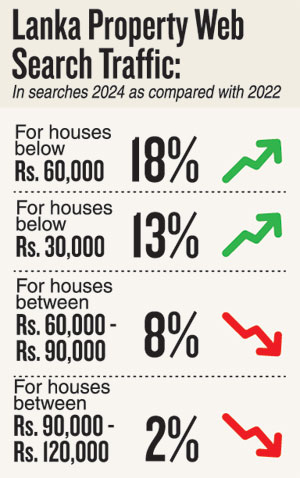News
Housing shortage in Colombo makes families endure substandard living
View(s):By Mimi Alphonsus
Amutha, her husband, and two teenage daughters lived in a tiny studio in Narahenpita until 2021, when the city informed them their home would be demolished due to illegal settlement. Facing the unknown of when the bulldozer might show up and already struggling to raise a family in such cramped quarters, Amutha decided to move.
Now in Mount Lavinia, she pays Rs. 20,000 for a two-bedroom house. While it’s a little roomier, the price comes at a cost: time spent commuting has ballooned.

V. Kulathunga
In Narahenpita, Amutha could walk to her job as a domestic worker, and her husband’s commute to the pharmacy where he works is under 30 minutes. “Now it takes us over an hour to get to work and for the kids to reach school,” she said. “Besides that, the environment here is not safe for our daughters.’’
Amutha, who came to Colombo from Hatton, says she wants to move again, but for now, this is all they can afford.
Her family’s unmet housing needs reflect the many problems families face when searching for affordable, secure housing in Colombo. High rents and unstable housing are pushing people into the suburbs.
After a dip during the economic crisis, migration from villages to the city is back on the rise. With it comes an increased demand for low- and middle-income housing.
According to Lanka Property Web, a platform for selling and renting houses and apartments, there has been an 18% increase in searches for units priced under Rs. 60,000 in 2024 compared with 2022. Interestingly, the same period showed a decline in interest for higher-end units priced over Rs. 60,000.
Unfortunately, even as the demand for housing has skyrocketed, the number of such housing units available has only gradually increased. According to estimates by Advocata, a think tank, in 2022, Colombo is facing a housing shortage of 26,978 units.
As a result of the skewed market, students, professionals, couples, and young families are forced to either endure low-quality housing conditions or live far from their work and school.
Bad rental deals and no rights as tenants

Small posters galore: Advertising houses, rooms and properties in the city. Pix by M.A. Pushpa Kumara
Kavisha, 25, (name changed) from Kandy works in a Colombo private company and rents a boarding room in Narahenpita for Rs. 15,000 per month. “Compared to the other ones out there, this is really good,” said Kavisha. She shares the room with one other girl but said the fan hasn’t worked since she moved in six months ago. 
The Sunday Times found several other boarding houses where six people share a room and a single bathroom. For women, stringent curfews and rules about guests make it hard to work late, have a social life, or enjoy basic independence. Boarding rooms are in such high demand that sometimes even children live in them—without parents—to be closer to their schools.
Renting a house or annex isn’t always better. Some families suffer harassment from landlords but cannot move out due to limited housing options.
An NGO coordinator working with low-income families (who requested anonymity) highlighted the social harm caused by abusive landlords who impose unreasonable restrictions on activities like playing music, hosting gatherings, or gardening.
“For example, if someone dies, landlords won’t allow tenants to display the body in the home as is traditional. Tenants feel it isn’t a place they can truly call home.” There is also financial exploitation, she explained, with landowners often refusing to return deposits or making excessive deductions for minor damage.
V. Kulathunga, a lawyer and chairman of Colombo rent board, confirmed these observations on financial exploitation. “What often happens is that a landlord takes a large deposit from a tenant and then, after a month or so, starts cutting electricity to the unit. This way the landlord can push the tenant out and pocket the deposit money.”
According to Mr. Kulathunga, the problem is that there are no laws in place to protect tenants. The Rent Act, which had some protections, is heavily outdated and doesn’t apply to about 95% of housing in Colombo. While a new law was passed in 2023, the Recovery of Possession of Premises Given on Lease Act, protecting landlord interests by smoothening the eviction process, no law exists to guard tenant rights, said Mr. Kulathunga. “There has to be balance.’’
Days spent on long commutes 
Unwilling to tolerate the conditions of cheaper units in Colombo and unable to pay for more expensive ones, many choose to live in the outskirts.
Amanda, a 25-year-old lawyer, and her family live in Ragama. She comes to court in Colombo nearly every day and spends, on average, 3 hours on trains and buses. “Travelling at peak hours when it’s so crowded and you can’t get a seat, I am so exhausted when I get home that I have to sit down for an hour before going to wash. Forget about cooking or working; all you can think of is sleep.”
Amanda said that as a student she missed out on opportunities because she lived far. “Friends would have late practices or even just go to watch a show, and I wouldn’t be able to,” she said. “Now that I’m older, I can travel later, even at night, and that makes it much better.”
Like Amanda, many children spend hours in buses, trains, and school vans, losing precious time for play and recreation.
According to data from 2019, nearly 2 million people enter the Colombo Municipal limits every single day. Most spend hours commuting with huge consequences in terms of fuel wastage, pollution, productivity loss, family time, and mental wellness.
| Builders weigh costs, buyers struggle with capital Nayana Mawilmada, an urban development specialist and president of the property sector at John Keells Group, argues that urbanisation in the Western Province has been poorly managed. He says the government has not focused enough on quality public transport, enabling the development of affordable apartments, and densifying near commercial hubs. As a result, people are relocating to the outskirts, living in houses on fragmented plots of land, and aspiring to own private vehicles. Mr. Mawilmada believes this trend is driven partly by a shortage of new apartments closer to the city, which he attributes largely to high construction costs caused by tariffs on building materials. Indeed, based on data from the Condominium Management Authority, at 61,111 units, condominiums only account for about 10% of Colombo’s total housing supply. Things are, however, likely to change in the next few years. According to Lanka Property Web, developments that were stalled due to the coronavirus epidemic and the economic crisis are now slowly picking up again. They expect around 8,000 apartment units to come on the market in the next two to three years. However, many of the new condominiums are expensive luxury developments targeting high-income local residents and Sri Lankans living abroad. These are profitable ventures for a developer, while building for middle- or lower-income markets is not, said Mr. Mawilmada. Affordable housing is unprofitable partly due to high construction costs and partly because middle- and lower-income buyers struggle to get housing loans. “Our banks are conservative, making it very difficult to get a housing loan,” said Mr. Mawilmada. “For a couple looking to buy their first home, securing a loan is almost impossible. But for wealthy individuals who already own properties—and likely don’t need a loan—it’s easy.” According to the Central Bank of Sri Lanka, only about 20% of condominiums bought in 2024 involved borrowings. The rest were bought with personal funds. The Sunday Times spoke to officials at both the Condominium Management Authority and the Urban Development Authority. Both discussed the importance of apartments in view of scarce land and confirmed their commitment to facilitating “vertical” rather than “horizontal” development. The government is dedicated to affordable housing, they said, but private developers are encouraged to invest at all levels so that the increased supply can bring down the price. | |
The best way to say that you found the home of your dreams is by finding it on Hitad.lk. We have listings for apartments for sale or rent in Sri Lanka, no matter what locale you're looking for! Whether you live in Colombo, Galle, Kandy, Matara, Jaffna and more - we've got them all!

